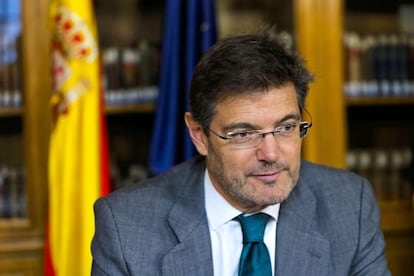Madrid will not stop Catalan secession vote if private groups organize it
Supreme Court turns down Barcelona's attempt to have suspension on campaigning lifted

The Spanish government will not act to stop this Sunday’s popular vote on self-rule in Catalonia if it is finally organized by private groups, rather than by the Catalan authorities.
That was the message sent out by Justice Minister Rafael Catalá on Thursday.
“If the Generalitat [Catalan government] does not promote acts developing an unauthorized consultation, it does not seem necessary to turn to the Constitutional Court or other judges and tribunals, since there will be no violation of the law,” he said.
The statements come on the same day that the Supreme Court rejected a request by the Catalan government to lift a suspension on all campaigning for Sunday. The suspension was ordered by the Constitutional Court, which accepted an appeal filed by Madrid arguing that all Spaniards should be allowed to vote on Catalan independence, not just Catalans.
But the legal wrangling goes back even further to September, when Madrid first filed a challenge against the original referendum on self-rule announced by the Catalan administration of Artur Mas.
When that referendum and all related campaigning was put on hold, Mas immediately announced a similar “participatory process” for the same date, November 9. While serving the same purpose, this vote would have no legal backing and no census to certify voters, thereby taking away some of its credibility.
The central government of Mariano Rajoy continued to appeal all moves by the Catalan executive until now, when it appears likely that the voting process will be handed over to the private sector, further eroding its legitimacy as an official reflection of Catalans’ feelings.
Madrid is now seeking to portray the vote as little more than an informal opinion survey — one of many conducted every day across the Spanish territory on all manner of topics.
“In a democratic society such as the Spanish one, the constitutional framework allows for many daily popular movements to collect signatures and find out people’s opinions,” said Catalá. “What we are saying is that a government cannot promote a consultation that goes against the Constitution. But nobody is going to stop citizens from exercising their freedom of expression.”
But with all scenarios still open, there is an outside chance that the Generalitat could retain organizing powers over the Sunday vote, leading prosecutors to order it halted. In that case, the Mossos d'Esquadra, the Catalan regional police, would have the obligation to do their duty and stop the vote from taking place, said Ramón Espalader, the Catalan commissioner for interior affairs.
“It is a far-off hypothesis,” he said. “But if it did, the Mossos d'Esquadra would do whatever the judge and attorney tell them to.”
But Espadaler insisted that Sunday “will be a civic day in which people will express themselves as they have to date, serenely and democratically.”
Tu suscripción se está usando en otro dispositivo
¿Quieres añadir otro usuario a tu suscripción?
Si continúas leyendo en este dispositivo, no se podrá leer en el otro.
FlechaTu suscripción se está usando en otro dispositivo y solo puedes acceder a EL PAÍS desde un dispositivo a la vez.
Si quieres compartir tu cuenta, cambia tu suscripción a la modalidad Premium, así podrás añadir otro usuario. Cada uno accederá con su propia cuenta de email, lo que os permitirá personalizar vuestra experiencia en EL PAÍS.
¿Tienes una suscripción de empresa? Accede aquí para contratar más cuentas.
En el caso de no saber quién está usando tu cuenta, te recomendamos cambiar tu contraseña aquí.
Si decides continuar compartiendo tu cuenta, este mensaje se mostrará en tu dispositivo y en el de la otra persona que está usando tu cuenta de forma indefinida, afectando a tu experiencia de lectura. Puedes consultar aquí los términos y condiciones de la suscripción digital.








































